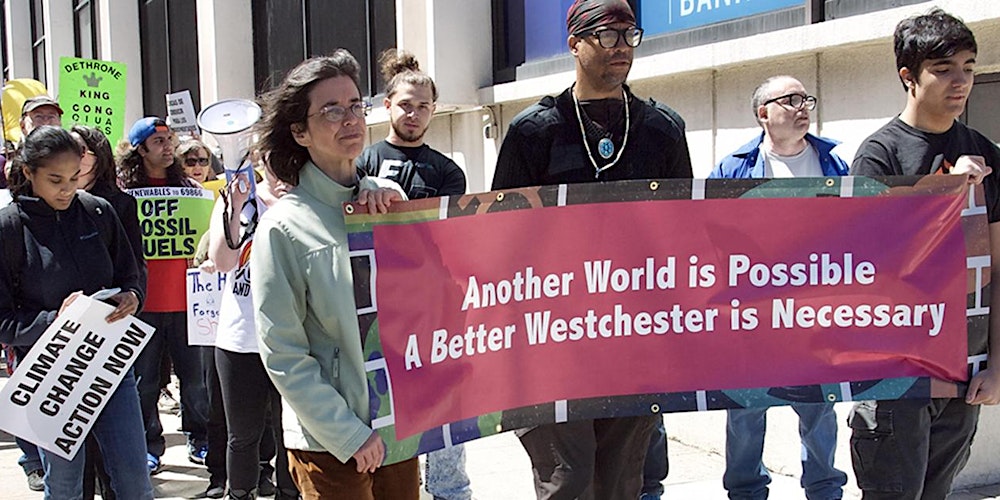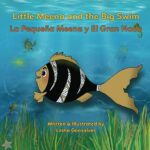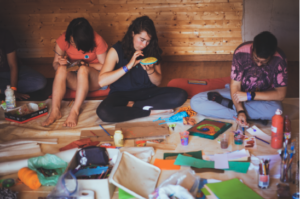2025 Lower Hudson Valley Social Forum
Sunday, April 27, 2025 — 11 am – 4:30 pm

Join dozens of community organizations from Rockland and Westchester for a social forum to exchange ideas and information, foster solidarity, and celebrate our work to create a more just and equal society. We live in a time of struggle as we witness growing threats to the well-being of our planet and communities, as profit is placed over people, and corporations, not communities, control our democracy.
Yet, we, the people, have the collective power to organize a movement for progressive social and economic change. The Lower Hudson Valley Social Forum 2025 will provide the space to learn from one another, strengthen our organizing skills, and connect as a community.
The organizing committee is comprised of:
WESPAC Foundation, Inc.
Here is a video clip from 2024:
Event Schedule
11:00 - 11:15 am
Gather behind the White Plains Library under the Pavilion
11:15 am - 12:00 pm
The People’s Parade! Let us make it colorful, vibrant and musical! Come with your banners, your signage, your musical instruments, your puppets, your song! This is our moment to celebrate our social justice community with all of our issues, our ideals and our struggles.
12:00 - 1:00 pm
1:00 - 1:45 pm
We transition inside for networking and browsing the tables.
1:45 - 2:30 pm
Opening Plenary Session
2:30 - 4:00 pm
Breakout Sessions
Please note that we have hired two professional Spanish translators and are also offering a special children’s breakout session!
4:00 - 4:30 pm
Closing Ceremony with the children singing the solidarity song that they have learned and with Prakash leading the God Dance for all of us where each person in our space will have their dignity and unique worth honored by our community.
Breakout Sessions & Workshops
Immigrant Defense
This panel will speak to the way allies and nonimmigrant community members can stand up and show up for our immigrant neighbors in dire times. The panel will go beyond “know your rights” and uplift forms of direct action and peaceful resistance that we can take together. The panel consists of legal information, not legal advice. Come with questions and with courage.
Engaging, Inspiring, and Involving Children! (Registration Req'd)
CHILD CARE OFFERING AT THE LOWER HUDSON VALLEY SOCIAL FORUM
We believe that every generation has a role to play in shaping a more just and compassionate world. We therefore make space for the youngest members of our community to explore, express, and engage with the aim of nurturing creativity, cooperation, and kindness. Children will enjoy several hands-on activities, including arts, crafts, and free play, while parents participate in the sessions of their choice.
Children are welcome to come and go as needed. Childcare is optional, and children can stay with their parents throughout the day if preferred. Healthy, child-friendly snacks will be provided, and our caring team will ensure a warm, safe, and inclusive environment for all.
 A special highlight of the day will be a live story time with local author and illustrator, Dr. Lorna Gonsalves. Dr. Gonsalves will read Little Meena and the Big Swim/La Pequeña Meena y el Gran Nado—a timely and relevant story. Children will dive into this underwater tale of collective triumph over bullying and greed. Our Spanish-speaking childcare specialists will help with translation on an as-needed basis. This being an inter-generational story, adults are encouraged to join the session, to help create an art piece that illustrates the theme of the story, and to practice singing Meena’s Song. The art piece and Meena’s song will be presented during the closing ceremony.
A special highlight of the day will be a live story time with local author and illustrator, Dr. Lorna Gonsalves. Dr. Gonsalves will read Little Meena and the Big Swim/La Pequeña Meena y el Gran Nado—a timely and relevant story. Children will dive into this underwater tale of collective triumph over bullying and greed. Our Spanish-speaking childcare specialists will help with translation on an as-needed basis. This being an inter-generational story, adults are encouraged to join the session, to help create an art piece that illustrates the theme of the story, and to practice singing Meena’s Song. The art piece and Meena’s song will be presented during the closing ceremony.
About the Author
Dr. Lorna Gonsalves has worked as a crisis counselor, university professor, non-profit director, and youth advocate. She holds degrees in Sociology, Counseling, Psychology, and Vocal Performance. Her life and work experiences around the world and especially in India and the United States have underscored the importance of storytelling, the arts, and collective action in envisioning and building a just world.
Please register here so that we may have enough copies of the book to send your child home with! Dr. Gonsalves will be available to sign copies of her book for each child.
Art Workshop: The Mosaic of All: Together in Difference (Registration Req'd)
 With the motif “together in difference” we will reflect collectively on what the motif tells us. Then each participant will make two paintings freely and creatively representing those unique cultural features that speak to their history as a community, origins, customs or as individuals.
With the motif “together in difference” we will reflect collectively on what the motif tells us. Then each participant will make two paintings freely and creatively representing those unique cultural features that speak to their history as a community, origins, customs or as individuals.Understanding the Solidarity Economy (Panel Discussion)
From theory to practice, this panel will explore the principles and real-world applications of the Solidarity Economy—an economic system rooted in mutual respect, democracy, social and racial justice, environmental sustainability, and cooperation. This transformative vision challenges the current model of individualism and unlimited private wealth accumulation. Panelists will share their experiences in implementing these ideas in their daily work.
Moderator: Delia Marx, co-Founder of the Westchester Cooperative Network
Panelists include:
Ali Issa is the General Coordinator of the Cooperative Economics Alliance of NYC (CEANYC). For over a decade, he has been involved in various social justice movements, working to connect struggles across different issues. He previously organized against police militarization with the War Resisters League, building coalitions across the U.S. and supporting solidarity efforts in Iraq and the Middle East. Ali also worked with the Urban Justice Center’s Street Vendor Project, advocating for vendors’ rights across New York City. Originally from Iowa, he is the author of Against All Odds: Voices of Popular Struggle in Iraq. A passionate fan of improvised music, he lives in Sunset Park, Brooklyn.
Dada Maheshvarananda is a yoga monk, activist, and author of six books, including After Capitalism: Economic Democracy in Action. He will share his vision for a new economy that ensures a high quality of life for all, based on ethical values, local economic sovereignty, regional self-sufficiency in food and medicine, economic decentralization, and cooperatives. He currently directs the Prout Research Institute in Asheville, North Carolina.
Carlos Martinez representing the New York City Network of Worker Cooperatives (NYCNoWC), Advocacy Council, Sunset Scholars, and Member of Alianza CUSP Inc. NYCNoWC is the trade association of worker cooperative businesses in the New York City metropolitan area. Its aim is to raise public awareness of workplace democracy and improve business conditions for democratic, worker-owned businesses.
Angela DeFelice (she/her) grew up in a rural, working-class community in Western New York and has lived in and around Poughkeepsie (Lenape/Mohican territory) for 15 years. Her community-based work in Ithaca, NY, and Ocotal, Nicaragua, led her to a decade-long career in agriculture. She co-founded and worked as a worker-owner at Rock Steady Farm, a queer-owned cooperative farm committed to social justice and food access in Millerton, NY. Since 2018, Angela has been dedicated to advancing cooperative and community ownership in the region. With over a decade of business management and consulting experience, she now serves as Managing Director & Senior Project Steward of Co-op Hudson Valley. A Good Work Institute Fellow, Angela also sits on the founding board of the Dutchess County-Poughkeepsie Land Bank and serves as an advisor to Westchester Cooperative Network
Joe Marraffino serves as New York State Loan and Outreach Officer at the Cooperative Fund of the Northeast (CFNE), offering nonprofit lending to food cooperatives, worker co-ops, housing co-ops, and others throughout the state that may not otherwise have access to capital. Joe previously coordinated the national Workers to Owners collaborative for the Democracy at Work Institute, supporting small businesses transitions to employee ownership. Prior to that he was the Finance Manager for the 12,000 member GreenStar Food Co-op. Joe’s formative years with the cooperative model were spent walking to 4am shifts in the fog as a worker-owner at Arizmendi Bakery in San Francisco, and then opening new bakeries for the Arizmendi Association of Cooperatives.
Food Sovereignty: Moving Towards Community Control of Our Food System and Agricultural Lands (Panel Discussion)
This panel discussion facilitated by Kat Altamura, founder of a newly emerging Food Not Bombs Chapter in White Plains, will explore the growing issues around food equity, food security, and food sustainability on the global, national, and local levels, and introduce some ideas on how we can address these challenges.
Katherine Schwarz, MS, MPH, is a Public Health Nutritionist. She has worked on food and food security issues in New York and in Malawi in sub-Saharan Africa. She is currently an adjunct, teaching in the Health Sciences Department at Lehman College and has taught about Food Security and Food Policy at Lehman and at New York Medical College. She is an educator and an advocate for changes in policies to make the food system more sustainable and address food insecurity through her own organization, Pulling at the Roots. Kathy is currently leading an effort to address food insecurity on the local level in Rockland County, through the Rockland Coalition to End the New Jim Crow, while also advising on the start-up of a demonstration garden for sustainable farming in Zambia.
Ruby Olisemeka is an independent educator/consultant focusing on socially transformative education; food justice and incorporating African and indigenous practices into farming and food & farming education. She began her farming career as an apprentice at Stone Barns (2011) and has since built numerous school and urban gardens in lower Westchester and Harlem. Ruby has over 10 years’ experience educating children and young adults, she has worked as an educator at Edible Schoolyard NYC, Harlem Grown and various public and private schools and institutions. She is currently a facilitator with Farmschool NYC – an urban agriculture training program for adults. She is passionate about reclaiming and transforming greenspaces in urban neighborhoods of color for the wellbeing of community; as well as facilitating nature connection lessons with children of color, wherever nature is found. She initiated and is a part of a grassroots community effort to bring local organically grown food to Mount Vernon residents at no cost/pay what you can model, entitled “The Free Peoples Market”.
Filipa Costa is the President of the Board of the Prout Research Institute. She comes to share an inspiring story of community-led transformation that is unfolding in Portugal’s Cova da Beira region, where local organizers have created a promising model for rebuilding local food systems from the ground up. Starting in 2020, the Prout Research Institute-Portugal brought together farmers, community members, schools, and local government to tackle a common challenge: despite having fertile land and skilled small-scale farmers, most food was being imported while local producers struggled to make ends meet. Through a process called “Block Level Planning” – which simply means getting everyone in an area of about 100,000 people to plan together – they’ve launched an ambitious initiative called “Cova da Beira Converge” that’s laying the groundwork to reconnect local farmers with schools, institutions, and community members. What makes their approach special is how they combine practical planning with fostering community, including regular gatherings that mix collaborative visioning with shared meals and traditional dancing.
A New Hope: The rising tenant movement and the fight against the Real Estate Empire (Panel Discussion)
Over the last 30 years, real estate has become the primary investment vehicle for wealthy Americans. The system they built to protect and grow their wealth relies on pushing more Americans into tenancy, driving up rents, and creating a culture of fear through mass evictions and abuse. The Great Recession and COVID exacerbated this crisis, driving millions of tenants into deep debt or homelessness. In response, tenant movements have popped up all around the country, finding different ways to fight and undo Real Estate’s control over their lives. In this workshop, we will review the various strategies tenant movements are using, the victories and failures we can learn from, and the role tenants play in the fight against fascism and Trump’s presidency.
Panelists include:
June Nemon is a tenant organizer based out of Poughkeepsie, New York. Originally from a tourist town in southern Appalachia, June was politicized as a teenager by rapid gentrification and the cruel human cost of the housing crisis. After traveling the country working on electoral campaigns, most notably Bernie Sanders’ 2020 presidential run, June settled down in the Hudson Valley in 2021 to develop long-term organizing programs that grow working class political power. In the years since, they helped pass tenant protection laws throughout the valley and organized the first ever legally mandated rent reduction in the country.
Brian Callaci is the Housing Working Group co-chair for Lower Hudson Valley DSA, which is working toward building tenant unions and securing good cause eviction protections in the Lower Hudson Valley. He is also an economist who has worked on housing policy, publishing in Harvard Business Review, the Atlanta Journal-Constitution, and Dissent Magazine.
Dennis Hanratty is the Executive Director of Mount Vernon United Tenants. Mount Vernon United Tenants (MVUT) is a grassroots, community-based organization that has been providing principled and effective tenant assistance for over 30 years. As the only funded and staffed Tenants Association in Westchester County, MVUT has been essential for protecting and extending tenants’ rights throughout Westchester County.
Combatting Hopelessness with Climate Action! (Panel Discussion)
The best cure for hopelessness is to act! We will be discussing actions and tactics we are using to continue to make progress under the current administration. Struggling with how to advocate on an issue? Let’s brainstorm together.
Facilitator: Courtney M. Williams, PhD, Westchester Alliance for Sustainable Solutions (WASS)
Courtney is a scientist, activist, community organizer, and mom fighting for environmental justice for Peekskill. She founded WASS in 2021 to push for Westchester County to close its largest industrial air polluter: The Wheelabrator trash incinerator that burns the county’s garbage and contributes to the public health emergency facing Peekskill residents. For over a decade she has been fighting the repeated expansion of the “Algonquin” Fracked Gas Pipeline and the colocation of the pipeline with Indian Point Nuclear Power Plant.
Panelists include:
Peggy Kurtz, Rockland Sierra Club
Climate change is an existential and absolutely urgent threat to life on this planet. With the Trump administration recklessly dismantling climate programs and critical protections in favor of oil, gas, and chemical companies, our activism is more urgent than ever before. Sierra Club, the largest grassroots network of environmentalist activists in the country, focuses on the climate crisis and other environmental threats such as toxic chemicals. A lifelong environmental advocate, Peggy Kurtz is on the Executive Committee of Lower Hudson Group of Sierra Club.
Shokoofeh Rajabzadeh, Climate Families Westchester
Shokoofeh Rajabzadeh is the lead organizer of Climate Families Westchester, a branch of Climate Families NY. A writer, scholar, mother, and dedicated activist, her work explores how stories from the past shape our modern conceptualizations of Islamophobia and white supremacy. She has organized with Climate Families, the Summer of Heat Campaign, Westchester for Palestine, and Jewish Voices for Peace, bridging movements for climate justice and Palestinian liberation. Grounded in the belief that all systems of oppression are interconnected, she is committed to collective action, knowing that every step toward liberation—for people or the planet—weakens the structures that bind us all.
Suzanne Barclay, Beyond Plastics
Launched in January 2019, Beyond Plastics is a nationwide project based at Bennington College in Bennington, Vermont, that pairs the wisdom and experience of environmental policy experts with the energy and creativity of grassroots advocates to build a vibrant and effective movement to end plastic pollution. We use our deep policy and advocacy expertise to build a well-informed, effective movement seeking to achieve the institutional, economic, and societal changes needed to save our planet, and ourselves, from the negative health, climate, and environmental impacts of the production, usage, and disposal of plastics.
Palestine Breakout Session
The Palestine breakout session will focus on local efforts to end the current genocide and ethnic cleansing in Gaza and the West Bank. Steeped in the basic principles of the preciousness of human life and the need for dignity, equality,and fundamental rights for all people, we will explore strategies of community activists to end the violence and move towards peace with justice for all. We will also discuss the obstacles that the current political climate presents for progressive activism and coalition building across the Lower Hudson Valley. Please join us!
Our Mission & Vision
The 2025 Lower Hudson Valley Social Forum is dedicated to fostering a world where peace and justice prevail. As a dynamic action network, we strive to empower communities by advocating for equitable social, economic, and environmental policies.
Our mission is to support grassroots movements that challenge systemic injustices and promote community resilience and self-reliance. Through education, advocacy, and collaboration, we aim to create a society where all individuals and communities have the opportunity to thrive and contribute to a just and peaceful world.
